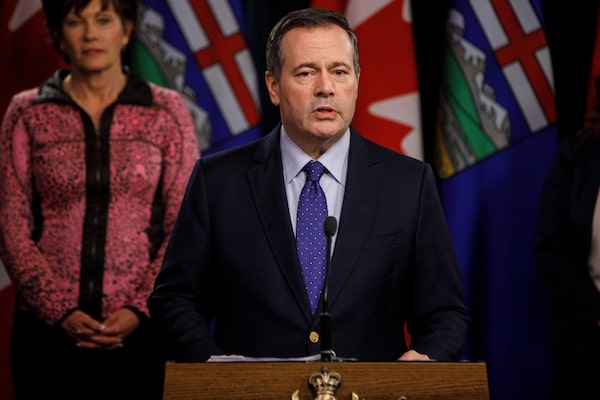
Ottawa imposed its consumer carbon tax on Alberta at the start of this year, after the United Conservative Party government of Premier Jason Kenney, seen here on March 20, 2020, scrapped a provincial tax brought in by his predecessor.JASON FRANSON/The Canadian Press
The Alberta government is appealing a decision that ruled against the federal carbon tax – a legal manoeuvre designed to give the province a more prominent role in a Supreme Court of Canada hearing expected later this year.
The province is hoping that the high court’s decision to delay an existing appeal, from Saskatchewan and Ontario, because of the COVID-19 pandemic will provide enough time to be added to the case. Currently, Alberta is limited to intervener status.
The Alberta Court of Appeal issued a 4-1 opinion last month that concluded the federal consumer carbon tax, which applies to gasoline, natural gas and other fuels, violates the constitution. The strongly worded decision described the federal carbon pricing system as a “constitutional Trojan horse.”
The Alberta ruling was an outlier compared with previous decisions in Ontario and Saskatchewan. Appeal courts in both provinces issued rulings, both split, that sided with the federal government.
None of the previous decisions is binding, but the Supreme Court of Canada’s eventual ruling is expected to settle the matter.
The Supreme Court was scheduled to hear appeals from Saskatchewan and Ontario in February, but that has now delayed all of its existing hearings until June at the earliest.
“Our government wants to ensure that the decisive decision of the Alberta Court of Appeal is given equal weight when deciding this important constitutional issue,” Jonah Mozeson, the press secretary for Justice Minister Doug Schweitzer, wrote in an e-mail.
Mr. Schweitzer previously wrote the federal government, demanding that it stop collecting the carbon tax in Alberta and refund any money already collected. He warned of additional legal measures, but so far the province hasn’t followed through.
Moira Kelly, press secretary for federal Environment Minister Jonathan Wilkinson, said in a statement the government remains confident the carbon tax is legal and that it’s needed to curb greenhouse gas emissions.
Ottawa imposed its consumer carbon tax on Alberta at the start of this year, after the United Conservative Party government of Premier Jason Kenney scrapped a provincial tax brought in by his predecessor. Mr. Kenney won last year’s provincial election on a platform that derided the “job-killing” carbon tax and made its repeal his first piece of legislation.
The federal tax, which applies to provinces that don’t have their own systems, is currently $20 a tonne. It will increase by $10 in April and again every year until it hits $50 by 2022. In addition to Alberta, it also applies in Saskatchewan, Ontario, Manitoba, Yukon and Nunavut. New Brunswick also falls under the federal tax but on April 1 will switch to a provincial system.
Ottawa has been under pressure to suspend the carbon tax as part of its plan to provide relief for businesses struggling from the COVID-19 pandemic. The B.C. government has announced it will delay a planned increase to its carbon tax.
The federal government offers rebates, administered through income tax returns, to offset the cost of the tax and maintains that most households will actually come out ahead. In Alberta, the rebate will average $888 for a family of four, the highest in the country, according to the federal government.
The consumer tax and the continuing court challenges are unrelated to the industrial carbon tax, including the system the Alberta government is imposing on its oil sands producers. That tax, which started this year at $30 a tonne, is being used to fund emissions-reducing technology, as well as general government spending.
We have a weekly Western Canada newsletter written by our B.C. and Alberta bureau chiefs, providing a comprehensive package of the news you need to know about the region and its place in the issues facing Canada. Sign up today.